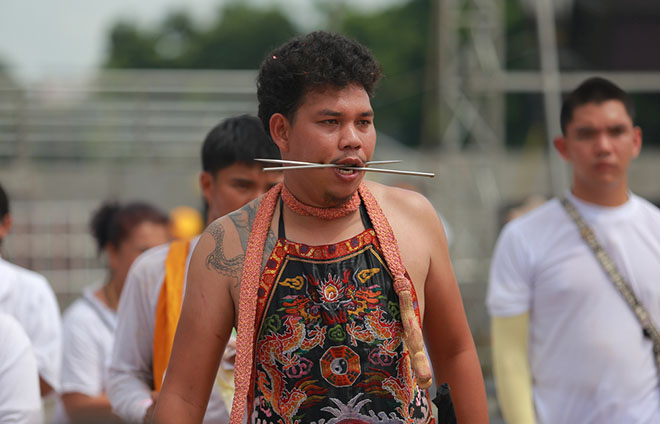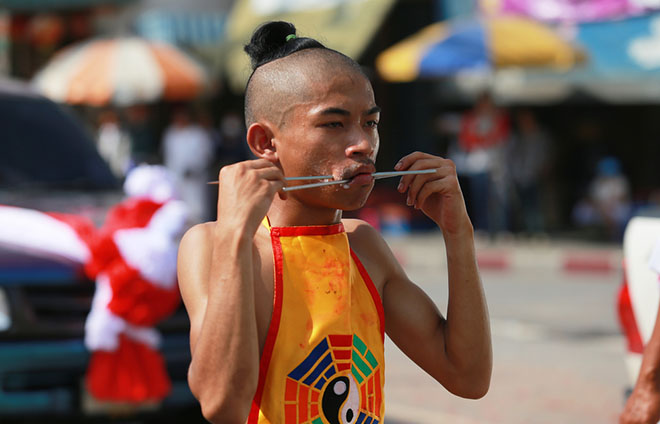When Westerners think of Phuket, Thailand’s largest island located 500 miles south of Bangkok in the Andaman Sea, it’s most often the luxurious attractions of a tourism industry that come to mind. Gorgeous beaches; cerulean-blue waters and breathtaking diving sites; the quaint simulacra of Old Phuket Town, with its historically preserved Sino-Portuguese architecture; and the more louche offerings of Phuket’s red light district, Bangla Road.
But beneath the fantasies projected for tourism revenue, there exists a deep-seated religious passion and cultural heritage that reveals itself during a bizarre and mesmerizing annual festival that inspires an indistinguishable blend of repulsion and attraction.
For nine days every October (a few days occasionally fall in September or November), Phuket celebrates the Vegetarian Festival, transforming itself into a singular tableau that is aesthetically captivating in a drastically different way than the paradisiacal waterfront resorts and remote lagoons. The Vegetarian Festival, a Taoist tradition based on the myth of the Nine Emperor Gods, said to be the sons of the Big Dipper Mother goddess, Dou Mu, is Phuket’s own distinct version of the Nine Emperor Gods Festival held throughout Southeast Asia.
During the festival, religious devotees skewer their tongues and cheeks with spears, steel rods, and guns; impale themselves with swords; climb knife-blade ladders; and walk through exploding firecrackers.
The celebration takes place during the ninth lunar month on the Chinese calendar, when devotees believe the emperor gods descend from heaven to Earth, arriving in various waterways. This year is unique because, according to the Chinese lunar calendar, there are actually two ninth lunar months in 2014, an anomalous event that happens just once a century. This marks the first time in Phuket’s history that the Vegetarian Festival is being held twice.
While the Nine Emperor Gods Festival is also observed in countries like Malaysia, Singapore, and Myanmar, Phuket Province has its own distinctive mythology and rituals attached to the event. In 1825, the Kathu district of Phuket was still covered in thick jungle, and Chinese workers toiled in the local tin mines. That year, China sent a traveling opera company to Kathu to entertain the emigrant workers. As legend has it, the company fell ill, probably from fever or an epidemic that had been afflicting the province. While ailing, one of the performers realized that his company had forgotten to pay homage to the Nine Emperor Gods during the prescribed time period—the first nine days of the ninth lunar month. To make up for their apostasy, the company sent one of its performers back to China to “invite” the emperor gods to Phuket. They also immediately began observing traditional methods of piety to the gods: The troupe abstained from meat, alcohol, sex, swearing, and basically any kind of partying in general. They consequently enjoyed a full recovery, astonishing the Kathu locals and, ultimately, inspiring the annual festival in Phuket, in which Thai Taoists observe the same meat abstinence and chastening behavior as the opera company.

(Photo: HARELUYA/Shutterstock)
But as a cursory Google search of “Phuket Vegetarian Festival” reveals, this is not simply a nationwide celebration of veganism. It is a sophisticated, painstakingly planned event: long processions of performers dress in white to signal observance of the vegan diet and a welcoming of the emperor gods; restaurant vendors hang red and yellow flags outside their establishment to indicate vegetarian dishes; and participants perform symbolic rituals near each of the six main Chinese temples in Phuket. But perhaps the greatest and certainly the most extreme, inimitable aspect of the Phuket Vegetarian Festival is the display of self-mutilation.
During the festival, which this year first took place from September 24 to October 2 and is being held again now, from October 24 to November 1, religious devotees skewer their tongues and cheeks with spears, steel rods, and guns; impale themselves with swords; climb knife-blade ladders; and walk through exploding firecrackers. The acts of self-mortification often employ a macabre ingenuity, as participants pierce themselves with objects ranging from revolvers to tire rims to gasoline pumps. But what lies behind the sheer exhibitionist spectacle of it all? Or, alternatively stated, why do these people do it?
It’s not just anyone that flays his skin when October rolls around in Phuket. While much of the Thai Chinese population in Phuket participates in the Vegetarian Festival in one capacity or another, only a select few engage in transmogrification. These men and women (mostly men) are known as the mah song, roughly translated as “horses of the gods.” This title refers to the idea that participants are surrendering themselves to the gods for the length of the festival.
Not everyone can become a mah song, though. Prospects must be unmarried and celibate at the time of the celebration, as the mah song become vessels for the emperor gods, and only the purest Thais are seen as worthy receptacles for this prestigious purpose. Further, many believe that in order to become mah song, one must be chosen by the gods. This phenomenon can happen through dreams, visions, or even a sudden possession.

(Photo: HARELUYA/Shutterstock)
One spirit medium claims that when he was taken to a Chinese shrine as a boy, he experienced a fit of xenoglossia, suddenly speaking Chinese despite never having learned the language. The reasons for a god to choose a specific person are myriad: in some cases, a person is sick or moribund, and becoming a mah song is seen as an opportunity to prolong life; others are chosen because they have residual bad karma from a previous life, and the act is a chance for spiritual purification; and still others receive the call simply because of a deep-rooted relationship with a particular god that has lasted many lives.
Before the parades and celebrations begin, the mah song enter a trance to prepare themselves to become mediums for the emperor gods. When they begin the ritual acts of mutilation, they are said to be under the protection of the gods, and therefore they feel little to no pain. The grisly procedures are performed without anesthetic, making it critical that devotees remain fixed in their trances. During the events, they often take center stage in the processions, performing the major rituals at each of the Chinese temples and inspiring solemn reverence from the crowds.
The relationship between the mah song and the rest of the Phuket people extends well beyond the nine-day festival. Taoists believe that by inflicting pain and torturing themselves, the mah song are redirecting bad luck and misfortune away from the community and onto themselves. This ensures that the coming year will be one of prosperity. In this way, the self-mortification is not unlike the austerity practiced by the rest of the participants in Phuket: all are engaging in acts of asceticism in order to achieve a higher state of spiritual purity. Still, the mah song also seem to draw on the ancient practice of ritual sacrifice: in each case, religious adherents are sacrificing themselves and their bodies as offerings to please the gods.
While the direct inspiration for the Vegetarian Festival is most often attributed to the 19th-century opera company and their miraculous convalescence, the development of specific rites and rituals in the event is more culturally scattered. It’s generally accepted that the festival is part of the larger Nine Emperor Gods tradition, one that traces its origins to Taoism and Chinese folklore. The event also marks the beginning of Taoist Lent, a month-long period of abstinence for the devout. Where the mortification rituals came from, however, is less clear. Many believe that they were adapted from the Thaipusam festival, a Hindu celebration honoring the god of war, Murugan. Thaipusam reaches the zenith of its religious agony and ecstasy in Malaysia, where, like the intrepid mah song, devotees participate in self-mutilation, in this case piercing themselves with hooks and lances that are often attached to large ornate structures known as kavadi, or “burden.”
Perhaps the origins of the rituals in Phuket’s festival are anthropologically nebulous and may not have been passed down from a direct line of doctrine and dogma. Nonetheless, the mah song are engaging in something far more profound than cultural mimicry. For them, the festival is a holy burden—a calling of mortal significance—offering them a chance to have their lives salvaged by the gods and invested in a greater spiritual cause.
Beneath the taboo spectacle of mortifying the flesh, the performance and responsibilities of the mah song endow them with manifest spiritual and civic purpose. When you’re marching through the streets leading extravagant processions with swords and skewers boring through your face, there’s just no slipping into obscurity. As god-medium Thitipong Saisutthikul recently put it in the Bangkok Post, “We believe that we were doomed to die already, but a phra [angel spirit] chose to help us and use our body to sacrifice for the good of the people.” This is heady altruism, a higher calling carved, punctured, and flayed in flesh and blood.





